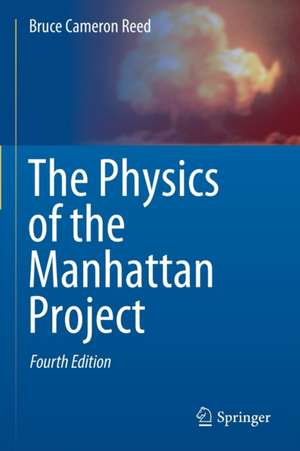The Physics of the Manhattan Project
Autor Bruce Cameron Reeden Limba Engleză Paperback – 4 ian 2022
Revisions to this fourth edition include many upgrades and new sections. Improvements are made to, among other things, the analysis of the physics of the fission barrier, the time-dependent simulation of the explosion of a nuclear weapon, and the discussion of tamped bomb cores.New sections cover, for example, composite bomb cores, approximate methods for various of the calculations presented, and the physics of the polonium-beryllium "neutron initiators" used to trigger the bombs.
The author delivers in this book an unparalleled, clear and comprehensive treatment of the physics behind the Manhattan project.
| Toate formatele și edițiile | Preț | Express |
|---|---|---|
| Paperback (2) | 387.38 lei 6-8 săpt. | |
| Springer International Publishing – 4 ian 2022 | 387.38 lei 6-8 săpt. | |
| Springer Berlin, Heidelberg – 23 aug 2016 | 468.44 lei 6-8 săpt. | |
| Hardback (1) | 476.63 lei 3-5 săpt. | |
| Springer International Publishing – 3 ian 2021 | 476.63 lei 3-5 săpt. |
Preț: 387.38 lei
Nou
Puncte Express: 581
Preț estimativ în valută:
74.15€ • 80.57$ • 62.33£
74.15€ • 80.57$ • 62.33£
Carte tipărită la comandă
Livrare economică 21 aprilie-05 mai
Preluare comenzi: 021 569.72.76
Specificații
ISBN-13: 9783030613754
ISBN-10: 3030613755
Pagini: 256
Ilustrații: XXIII, 256 p. 88 illus.
Dimensiuni: 155 x 235 x 19 mm
Greutate: 0.4 kg
Ediția:4th ed. 2021
Editura: Springer International Publishing
Colecția Springer
Locul publicării:Cham, Switzerland
ISBN-10: 3030613755
Pagini: 256
Ilustrații: XXIII, 256 p. 88 illus.
Dimensiuni: 155 x 235 x 19 mm
Greutate: 0.4 kg
Ediția:4th ed. 2021
Editura: Springer International Publishing
Colecția Springer
Locul publicării:Cham, Switzerland
Cuprins
Preface.- Preamble: Fundamental Data On Little Boy and Fat Man.- Energy Release in Nuclear Reactions, Neutrons, Fission, and Characteristics of Fission.- Critical Mass, Efficiency, and Yield.- Producing Fissile Material.- Complicating Factors.- Miscellaneous Calculations.- Appendices (A-K).
Recenzii
“The volume is targeted at readers with an advanced undergraduate physics background, with the goals of explicating the principles behind the fission bombs completed in 1945, and of using these principles to illuminate more general areas of physics, such as electromagnetism and statistical mechanics. … both physicists and historians might find it most useful as a reference work.” (Joseph D. Martin, Metascience, Vol. 30, August 25, 2021)
Notă biografică
Bruce Cameron Reed is the Charles A. Dana Professor of Physics at Alma College (Michigan), emeritus. He has published five textbooks and over 50 journal papers and semi-popular articles on the Manhattan Project; three of the texts are with Springer (one of these is currently in press, a popular treatment of the Project). In 2009, he was elected a Fellow of the American Physical Society in recognition of his contributions to promoting understanding of the history and physics of the Manhattan Project.
Textul de pe ultima copertă
The development of nuclear weapons during the Manhattan Project is one of the most significant scientific events of the twentieth century. This revised and updated 4th edition explores the challenges that faced the scientists and engineers of the Manhattan Project. It gives a clear introduction to fission weapons at the level of an upper-year undergraduate physics student by examining the details of nuclear reactions, their energy release, analytic and numerical models of the fission process, how critical masses can be estimated, how fissile materials are produced, and what factors complicate bomb design. An extensive list of references and a number of exercises for self-study are included.
Revisions to this fourth edition include many upgrades and new sections. Improvements are made to, among other things, the analysis of the physics of the fission barrier, the time-dependent simulation of the explosion of a nuclear weapon, and the discussion of tamped bomb cores.New sections cover, for example, composite bomb cores, approximate methods for various of the calculations presented, and the physics of the polonium-beryllium "neutron initiators" used to trigger the bombs.
The author delivers in this book an unparalleled, clear and comprehensive treatment of the physics behind the Manhattan project.
Revisions to this fourth edition include many upgrades and new sections. Improvements are made to, among other things, the analysis of the physics of the fission barrier, the time-dependent simulation of the explosion of a nuclear weapon, and the discussion of tamped bomb cores.New sections cover, for example, composite bomb cores, approximate methods for various of the calculations presented, and the physics of the polonium-beryllium "neutron initiators" used to trigger the bombs.
The author delivers in this book an unparalleled, clear and comprehensive treatment of the physics behind the Manhattan project.
Caracteristici
Only treatment of the physics of Manhattan Project-era fission bombs prepared by a recognized expert on the topic Surveys all aspects of the physics of fission weapons, from the characteristics of fission to analyzing critical mass, bomb yield, how to trigger the nuclear explosion in the first place, and complicating factors such as the probability that a bomb will “pre-detonate” Technical points illustrated with numerous graphs Includes student exercises, with answers
